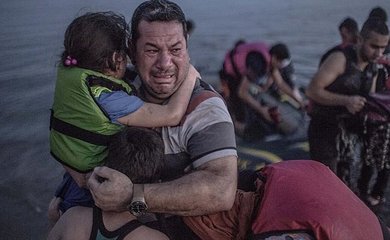It hasn’t been uncommon for quite some time now to see destitute and dirty Syrian children sleeping rough on the streets of Istanbul these days. Like millions of their counterparts they have been deprived of their childhoods by the cruel war that has destroyed their country. The sight of such a proud people having to endure the many degradations and the humiliation brought on by having their country destroyed is a truly depressing one to behold.
With no end in sight to the four-year-old war in Syria after four years the refugee crisis is steadily getting worse. And it is doubtful that it will improve any time soon. Over 4 million Syrians are refugees. Many of whom are residing in refugee camps in Turkeys. Others have flooded into Syria’s neighbours of Lebanon – a country of approximately 4 million which has taken in 1.2 million Syrians and doesn’t presently have a functioning government. Zaatari refugee camp in the Kingdom of Jordan has essentially become a permanent de-facto city made-up entirely of Syrian refugees. It’s Jordan’s fifth-largest city in fact.
Syria was by no means a well-off country before this conflict begun. Its worst drought in decades (2007-10) saw a large migration of peasant farmers into Syria’s cities where they found it hard to find work to sustain themselves. The conflict has seen most of Syria’s industry turned into rubble and the economy has been contracting to levels not seen since the 1980’s. Even if the war ended tomorrow, it would take years for Syrians to rebuild a functioning state. And it’s only steadily getting worse. It would be no surprise if we see the millions displaced within Syria itself (about half of Syria’s 22 million population have been displaced) flee in the coming months and years and double the number of refugees which aid agencies and outside countries are already struggling to deal with.
The tragic death of the young three-year-old Syrian Kurdish boy Aylan Kurdi once again brought home the plight of migrants who are trying to reach European countries who they hope will accept them as asylum seekers. Which has led to renewed debate over how to adequately address this issue. This all, of course, follows the drowning of many refugees fleeing the anarchic war-torn state of Libya across the Mediterranean this summer. (One suspects that TIME Magazine may choose the Middle Eastern/North African migrant as its Person of the Year.)
Responsibility is a major theme in some debates about the causes and origins of these titanic crises. One has heard frequently in recent days debates about whether or not western action or inaction has resulted in these crises in Libya and Syria. This makes for an interesting debate since the western powers did intervene in Libya back in 2011 against a brutal dictator but not in Syria. Yet in both countries we see extreme chaos and violence.
Proponents of the argument that western military interference in the region caused the Libya crisis invariably point out that, as horrible as its former dictator Muammar Gaddafi was, the Libya of his day was an oasis of stability compared to the anarchic Somalia-like situation which exists there today. However one would urge proponents of this argument to remember that when NATO fighter jets began bombing Gaddafi’s forces it was to stop him sacking the cradle of the Libyan uprising in the country’s second-city Benghazi. Remember one of the pretexts for the intervention was to stop Gaddafi’s air and armoured forces destroying that urban center which could well have seen its inhabitants make a desperate attempt to flee across the Mediterranean.
In Syria it was clear that the immediate aftermath of the lengthy and unpopular American and British embroilment in Iraq (a war launched under questionable justifications and pretexts) discouraged intervention against the Syrian regime of President Bashar al-Assad. Inaction there still resulted in the grave humanitarian crisis we face there today which has seen to Syrians become the largest per-capita population of refugees in the world since the Afghan crisis of the 1980s, which was instigated by the Soviet Union’s invasion and occupation of that country.
Aversion to costly embroilments in the Middle East doubtlessly discouraged a greater involvement in Syria over the course of the past four years (the ongoing U.S.-led air strikes against ISIS has been limited to parts of the country’s north and northeast and is primarily a targeted counter-terrorism campaign). Fear of an Iraq-like embroilment has seen to a situation evolve that is more reminiscent of the crisis in Rwanda in 1994 (especially given the rise of groups with genocidal-minded ambitions like Islamic State who would doubtlessly massacre Syria’s 3 million Alawites if they ever get the chance) than Iraq in 2003.
That being said, like Rwanda in 1994, nobody can say for sure if any action taken in Syria could do much to alleviate the harsh humanitarian crisis that country and its people are facing. What is left is to try and find effective and feasible ways to accommodate and assist these struggling Syrians in their time of need.

